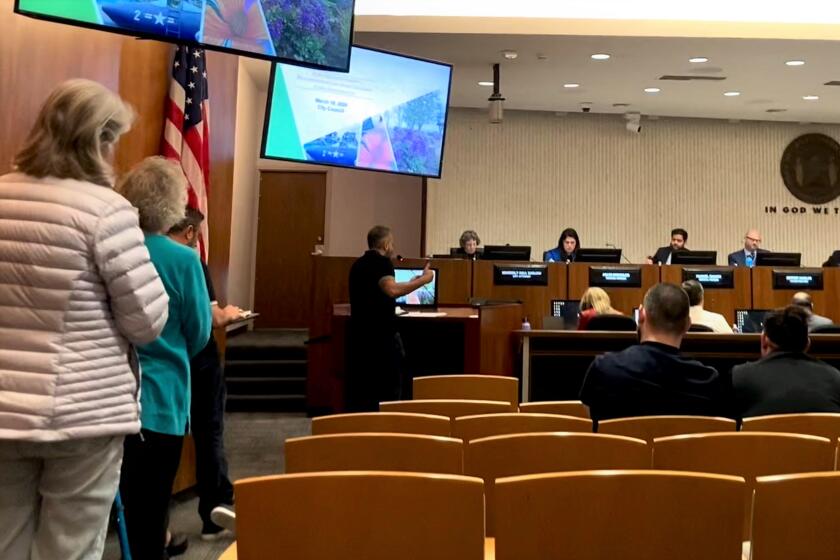Edits to Costa Mesa’s retail cannabis laws lurch forward despite council tug-of-war

- Share via
Despite an attempt to modify motions made by Costa Mesa council members last month amending the city’s retail cannabis ordinances — which address some problems but potentially open the door to new ones — panelists Tuesday doubled down.
Following a March 19 public hearing, the council largely favored instituting a 250-foot buffer between dispensaries and any properties in a residential zone and increasing a separation requirement between the shops and youth centers from 600 feet to 1,000 feet.
Members also decided to cap the number of cannabis business permits issued at 35, allowing those who’ve already begun the application process to continue, then suspend processing applications until a time when the number of businesses shrink by attrition until there are fewer than 10 operators, then set 10 as the new cap.
Once approved in a second reading, those proposals will render many shops already approved by the city legal nonconforming businesses, meaning they will be allowed to continue operations in defiance of city laws. However, it is unclear whether that status could hinder future business transactions.
Dispensary owners could also face challenges should they decide to sell or transfer ownership of the business, because that individual would be required to obtain a new cannabis business permit but could not do so if the cap of 35 permits had already been reached.
Mayor John Stephens attempted to edit some of the March 19 recommendations Tuesday, putting forth a new motion. He proposed instituting a cap of 35 conditional use permits, which, unlike cannabis business permits, run with a property and not a proprietor.
He additionally moved to continue processing applications already in the pipeline, but instead of landing on a final number of 10 shops, he suggested the city stop processing new requests for a period of three years, at which point the City Council would then consider whether to impose any separation requirements.
A discussion Tuesday over amending Costa Mesa’s retail cannabis laws ended with a flurry of motions from officials that, if approved, could have impacts on the industry.
“[At that time] we will be able to make this decision about the program based on data, the historical data, what is happening on the ground, as opposed to where we’re at right now, which is about halfway through the program,” the mayor maintained.
Stephens further recommended city staff move forward with processing applications as quickly as possible, working first on proposals that were ready to go, rather than sticking to a tiered system that gave priority to proprietors who’d partnered with cannabis distributors and manufacturers already operating in Costa Mesa.
Before seconding Stephens’ motion, Councilman Loren Gameros asked city staff to explain a provision in the new draft ordinance requiring that not only cannabis operators, but all financial interest holders in that business, seek separate business permits from the city. Any violation could cause a cannabis business permit to be revoked.
That line was added into the ordinance language after the Costa Mesa Planning Commission signed off on the document in December and included in drafts presented to the City Council in March and again Tuesday. Assistant Development Services Director Scott Drapkin confirmed the addition was made by the city attorney’s office.
“[What] if someone has a 5% interest, or what if they’re leveraging money from a financial institution or something like that?” Gameros asked.
Assistant City Atty. Tarquin Preziosi said state law requires any financial interest holder in a cannabis business with a 20% or greater stake in the enterprise to be publicly disclosed. Consequently, elected officials who’ve received donations of $250 or more from those stakeholders would be obligated to recuse themselves from decisions involving that business for one year.
“However, there is no state law that requires financial business holders to pull a business license,” Preziosi added. “That’s purely optional by the City Council.”
Gameros and Stephens indicated their desire to strike the business license requirement, in part, because it is not applied to any other business that operates in Costa Mesa.
But the motion they both backed was superseded by a substitute motion from Councilwoman Andrea Marr, who proposed moving forward with the ordinance presented by staff, which included the March 19 proposals and the business license requirement.
Seconded by Councilman Manuel Chavez, the vote passed 6-1 with only Stephens opposed and will come back to the council for a second reading, likely as a consent item that does not require further comment ahead of a vote.
Councilman Don Harper, who’s repeatedly expressed concern about what he feels are lax rules formed with too much input from the cannabis industry, explained his desire to change legislative direction.
“We’re trying to get something a little longer term and send a message, based on what we’ve learned and based on how this council was influenced to design this ordinance,” he said. “I think we made a mistake, we’ve learned from that and we’re trying to alter course.”
Jim Fitzpatrick, a former Costa Mesa planning commissioner who now advises cannabis enterprises on working within the municipal process, said the city’s proposed amendments are troubling for operators wishing to do legal business in Costa Mesa.
“To require a business license for a financial interest holder was sneakily inserted without explanation and represents a problem,” he said Friday. “Industry members intend to pull the consent item for discussion and demand the City Council get an explanation of why Costa Mesa is the only city to require [such a thing] or to remove the bad policy at once.
All the latest on Orange County from Orange County.
Get our free TimesOC newsletter.
You may occasionally receive promotional content from the Daily Pilot.





